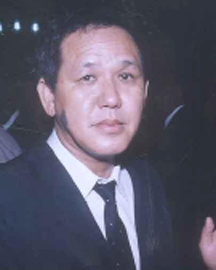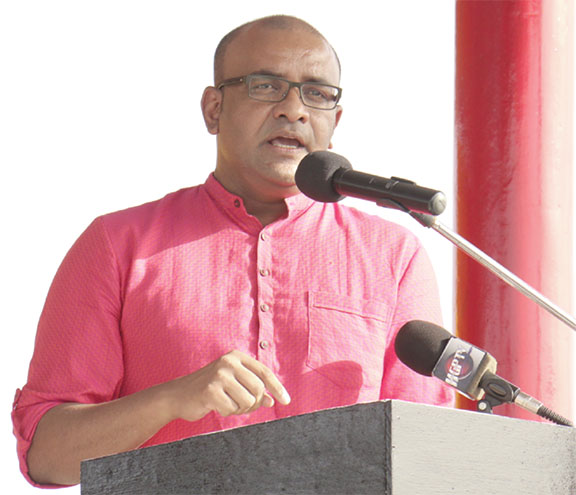Acting Chief Justice Ian Chang yesterday afternoon ruled that the presidential term-limit is unconstitutional without the approval of the people through a referendum, thereby creating an opening for another run by former president Bharrat Jagdeo.
Ruling on an action brought by citizen Cedrick Richardson, who challenged the restriction created by amendments to Article 90 of the Constitution that were enacted in 2001 after the bipartisan constitution reform process, Justice Chang found that the changes “curtail people’s democratic choices” and offend declarations in Articles 1 and 9 that Guyana is a “democratic state” in which “sovereignty resides in the people.”
“The court therefore holds that Act No. 17 of 2001, in so far as it seeks to trench on and to dilute the pre-existing democratic rights of the electorate to elect as President a person of their own choice, needed referendum and is invalid and without legal effect for reason of non-compliance with Article 164 (2)(a) and or repugnancy with Article 1 (democratic society) and Article 9 (sovereignty belongs to the people)- both of which require a referendum for any alteration,” he wrote in his 37-page decision, which was delivered in chambers.

“Articles 1 and 9 underpin the republican commitment to the fundamental concept of popular sovereignty or imperium populi thereby safeguarding against elective despotism by the elected representatives of the people. Thus, while the constitution provides for representative democracy, such representative democracy cannot trench on popular sovereignty from which it derives and which is entrenched by the requirement of the referendum,” he added.
Former Speaker Raphael Trotman, who was listed a respondent in the matter along with former Attorney General Anil Nandlall, told reporters at the National Assembly yesterday that the decision has implications beyond presidential term-limits and may cut across the full gamut of reforms that government and the opposition put in place during the constitution reform process.
“We knew that this was the decision because we had gotten word that it had actually been written up since before the elections. As disappointed as we are, we are not surprised. He’s just a judge of first instance and something like this, as I said, must be tested in the highest court because if allowed to stand it would really undermine the very constitutional framework of the country and put the entire country into a tailspin,” he said.
In addition to allowing Jagdeo to seek re-election, Justice Chang’s ruling also appears to enable persons who have become Guyanese citizens by virtue of registration to run for president, as well as to invalidate a requirement that candidates be resident in Guyana on nomination day and for at least seven years prior.
These qualifications had also been effected by the amendments to Article 90, which also saw the inclusion of two clauses to allow for re-election only once.
Article 90 Clause 2 states, “A person elected as President after the year 2000 is eligible for re-election only once,” and Clause 3 states, “A person who acceded to the Presidency after the year 2000 and served therein on a single occasion for not less than such period as may be determined by the National Assembly is eligible for election as President only once.”
‘Referendum required’
In the summons, Richardson claims that Act No. 17 of 2001, which was passed by a two-thirds majority of all elected members of the National Assembly, “unconstitutionally curtails and restricts his sovereign and democratic rights and freedom” as a qualified elector “to elect the person of former President Bharrat Jagdeo” as Executive President.
According to Justice Chang’s ruling, while there is no doubt that Parliament could have altered Article 90 by a two-thirds majority of all the elected members of the National Assembly, by virtue of the fact that the alterations diluted and further restricted democratic sovereignty, the holding of a referendum was required.
He reasoned that it would have been otherwise if the alterations were directed to the removal of a pre-existing disqualification rather than the imposition of further disqualifications on persons for presidential candidature.
“Since the alterations effected by Act No. 17 of 2001 to Article 90 also dilute and diminish democratic sovereignty under Articles 1 and 9, the holding of a referendum was required to achieve legal validity and efficacy,” he added.
Justice Chang also noted that if Article 90 (2) and (3) in their present form were part and parcel of the original 1980 constitution, they would have stood as constitutional limitations defining and determining the democratic rights of the electorate in the election of a president. “However, since those paragraphs were sought to be inserted in the Constitution after the coming into operation of the Constitution and they purported to impose further restrictions on the sovereign democratic rights of the electorate in their election of President, a referendum was needed,” he wrote, while pointing out that Articles 1 and 9 of the Constitution cannot be altered expressly or by necessity except through a process in accordance with Article 164(2)(a).
Richardson’s action questioned whether the Act is unconstitutional for the non-compliance with Article 164 (2) (b); whether it has the consequence of restricting and curtailing the democratic rights and freedom of the electorate by purporting to eliminate from the executive presidential candidate a person who has been re-elected as executive president; whether it required for its legal validity the holding of a referendum of the people; and whether it diminishes and reduces the level of democracy enjoyed by the electorate prior to the purported alteration and therefore required the holding of a referendum for such alteration. Justice Chang answered in the affirmative in all the instances.
Jagdeo, who was elected in 2001 and 2006, has repeatedly maintained that he is not interested in a third term. Although feelers have been put out to gauge public support for a re-election bid in spite of the restriction, he has distanced himself from these efforts.
The challenge, which was initiated in February, just three months before Guyanese headed to the May 11th polls, raised questions about its timing and the motives of Richardson, who identified himself in court documents as a 50-year-old driver of West Ruimveldt.
Richardson’s attorney Shaun Allicock when asked about the genesis of his client’s action, had told Stabroek News that Richardson is a Guyanese and one who exercises his voting rights and who felt that his constitutional rights had been affected by the amendments.
Trotman was represented by attorney Roysdale Forde.






